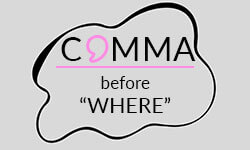
To remain clear and structured and to enable an easier understanding, the correct use of commas in an academic paper is integral. Many students still have difficulties with the correct use of commas due to a lack of proper knowledge about the comma rules. Therefore, mistakes can easily happen. With the explanation of the rules of using a comma before “where” this article aims to clarify this phenomenon.
When to place a comma before “where”
To figure out the correct comma use before “where,” it is essential to investigate the sentence structure. The word “where” can function as an adverb, conjunction, or relative pronoun. To understand the correct meaning of the sentence, it is important to figure out whether “where” introduces a restrictive or non-restrictive clause.
You need to put a comma before the “where” when it introduces non-restrictive information that could be left out without affecting the complete meaning of the main sentence. Since non-restrictive information is typically additional knowledge, a comma before “where” indicates that the given information does not influence the full meaning of the sentence. Therefore, the word “where” functions as a non-restrictive element and requires a mandatory comma placement.
On the contrary, you don’t need to place a comma before the word “where,” when it introduces restrictive elements. In this case, “where” does not require a pre-comma to clarify that it is a crucial part of the sentence. In addition, a comma before the word “where” is unnecessary if it is part of an indirect question.
Comma
Non-restrictive elements
No comma
Restrictive elements
Indirect questions
Comma rules may vary depending on different Style Guides. In general, it is to be considered whether the sentence is easily understood and read without the usage of a comma.
Comma before “where”
Essentially, a comma before “where” is necessary when the word introduces non-restrictive information, meaning information that is not essential to the complete meaning of the overall sentence.
Non-restrictive elements
Non-restrictive elements contain information that is additional and not necessary for the main understanding of a sentence. When the word “where” is part of a so-called non-restrictive clause, a comma before the word is necessary to signify it could be left out and only serves as side knowledge.
No comma before “where”
You don’t need to use a comma before “where” when it introduces a restrictive clause containing essential information for the complete meaning of the sentence. If the word “where” is part of an indirect question, you should also not place a comma before the word.
Restrictive elements
When “where” is followed by contextual information that is crucial for understanding the rest of the sentence, a comma before is omitted. This makes a clear indication that the restrictive information introduced by “where” is an essential part and cannot be left out.
Indirect questions
Using a comma before the word “where” is not necessary when the word is part of an indirect question. An indirect question is a sentence that expresses a question asked by someone else, or a question that is embedded within a statement or another question.
Test yourself!
Practice sheet
Take this test to check your understanding of the use of commas before “where.” The correct answers can be found in the second tab.
- Could you tell me where Sarah is?
- Do you by any chance know where the library is?
- Dan finally felt like he was where he belonged.
- The Sahara where snakes live, is very dry.
- I moved to Spain where, surprisingly, I felt at home.
- He went to the cinema where he met his girlfriend, to watch a film.
- Max hated Cologne where his family was from.
- It does not matter where you are from.
- Do you happen to know where Cindy lives?
- Houston, Texas where Beyoncé is from, is a dangerous area.
- Could you tell me where Sarah is? (No comma)
- Do you by any chance know where the library is? (No comma)
- Dan finally felt like he was where he belonged. (No comma)
- The Sahara, where snakes live, is very dry. (Comma)
- I moved to Spain, where, surprisingly, I felt at home. (Comma)
- He went to the cinema, where he met his girlfriend, to watch a film. (Comma)
- Max hated Cologne, where his family was from. (Comma)
- It does not matter where you are from. (No comma)
- Do you happen to know where Cindy lives? (No comma)
- Houston, Texas, where Beyoncé is from, is a dangerous area. (Comma)
- ✓ 3D live preview of your individual configuration
- ✓ Free express delivery for every single purchase
- ✓ Top-notch bindings with customised embossing

FAQs
A comma before the word “where” is necessary, when it is part of a non-restrictive clause introducing additional information that is not necessary for the meaning of the main sentence.
Example: Munich, where Max is from, is a big city.
In general, it depends on the context whether the use of a comma is necessary or not. When the word “where” is part of a non-restrictive clause, you should place a comma before “where.” A comma after where is less common and may be necessary when a series or list follows, a coordinating conjunction, or for clarity and emphasis.
Here are some example sentences with a comma before “where”:
- The United States, where the concept of the American Dream still exists, is a popular place for artists.
- She stayed at Julian’s place, where, remarkably, she felt welcomed.
